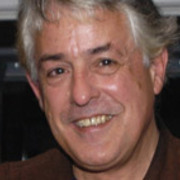
Stephen McCurdy
Stephen McCurdy's work for the screen ranges from the jazz/country exuberance of Came a Hot Friday, the spare and sombre orchestral score for Barry Barclay's Feathers of Peace, to the cello and sampler shadings of End of the Golden Weather.
McCurdy began playing cello as a child in Cambridge, and later studied cello with Zdenek Konicek, co-founder of the 60s-era Prague Quartet.
At Canterbury University McCurdy studied music, not quite finishing a thesis on the pre-serial atonalism of composer Arnold Schoenberg. He also met a number of future film figures — including director John Reid and actor Sam Neill — and began writing music for university theatre productions.
From the mid 70s onwards, theatre became McCurdy's second home - as a composer, musical director, lyricist and photographer on many shows. Among the earliest productions McCurdy composed for was depression-era piece Songs to Uncle Scrim (1976), the first of three genre-stretching song-plays by Mervyn Thompson.
He also worked on a Dracula musical at Mercury Theatre, written and directed by frequent future collaborator Ian Mune. By then McCurdy had already composed his first film score, working with a team of talented first-timers on 1979's adaptation of Roger Hall hit Middle Age Spread. Amongst general praise for the film, Variety's Kiwi scribe Mike Nicolaidi praised McCurdy's "excellent original music".
Soon after McCurdy unexpectedly found himself contributing music to Merry Christmas Mr Lawrence, when Japanese director Nagisa Oshima decided he needed a musical piece for one of the film's child characters. McCurdy happened to be in the office of Larry Parr, who was busy arranging the film's Auckland shoot, and got the job, despite the film's composer Ryuichi Sakamoto already being present on set (Sakamoto appears on-screen as a prison camp commandant).
Thanks to favourable tax breaks, the first half of the 80s saw an explosion of film production in New Zealand: McCurdy found his talents very much in demand. He began boning up on the complexities of studio recording with TV series Heroes, based around a pop band (including Michael Hurst and Jay Laga'aia) trying to make it big, for which McCurdy and co-composer John Gibson won a GOFTA award. McCurdy was also composing the first of several 100 television commercials.
In 1985 McCurdy won a New Zealand Film Award for his work on the Larry Parr-produced Came a Hot Friday. Based on the novel by former dance band musician Ronald Hugh Morrieson, the film was praised by Variety as a breakthrough in Kiwi comedy. Friday's 40s-style country/jazz soundtrack featured contributions from veteran jazzmen Crombie Murdoch and Andy Brown, plus vocalists Beaver and Prince Tui Teka.
After the film's release McCurdy revisited two Came a Hot Friday tracks for release as a single, but Tui Teka passed away before his recordings could be completed. On the song 'Work for the Money' there was only a single take of one chorus and one verse to work with, requiring some ingenious editing. The second Tui Teka/McCurdy track 'Out in the Cold' was later collected on Tui Teka compilation The Greatest.
McCurdy's rush of mid 80s feature film scores also included chamber music for drama Leave All Fair, and songs and synth misfire Bridge to Nowhere (ironically one of McCurdy's only other film compositions to see vinyl or CD release). By the time McCurdy composed the music for car chase romp Shaker Run in September 1984, the arrival of drum machines and samplers allowed the possibility of locking music to picture, as accurately as one hundreth of a second.
McCurdy won another Film Award when he reteamed with Hot Friday/Bridge to Nowhere director Ian Mune, and provided the music for The End of the Golden Weather (1991). McCurdy's soundtrack, prominently showcased in the film's trailer, was praised by reviewers for The Dominion, The Sunday Star, and The Auckland Express, where Chris Hegan called his score "extraordinary". McCurdy talks in detail about composing the film's "very Germanic" soundtrack in the book Shadows on the Wall.
McCurdy would like to have used a full orchestra: instead the soundtrack features a delicate blend of samplers with cello (in McCurdy's opinion "one of the most emotive, passionate instruments") and woodwind. McCurdy describes the film as a rite-of-passage tale about a boy who "believes in magic, and music is part of his arsenal to create magic ... the music is Geoff's emotional life, how he sees things."
McCurdy's television work includes the first, Ian Mune-directed series of comedy Letter to Blanchy, plus theme music for staples Holmes and Heartland. He has also composed for many documentaries, including Rogernomics four-parter Revolution and Keith Hunter's Remand of Ivan Curry.
Having collaborated with singer Shona Laing for a track on the Bridge to Nowhere soundtrack, McCurdy went on to co-produce Laing's synth-heavy hit album South (1986). The album was released under Larry Parr's indie label Pagan Records. McCurdy has praised Laing's passion and refusal to compromise, arguing that she writes "songs to make things better, to denounce bullshit".
McCurdy had worked with director Barry Barclay as far back as 1976, when he took stills for Autumn Fires. Later he provided the music for what turned out to be Barclay's final two films: the ambitious Feathers of Peace, and documentary The Kaipara Affair. McCurdy was also called in to provide the soundtrack for Graeme Tuckett's documentary on Barclay, The Camera on the Shore. He also provided the music for 2009's Dirty Bloody Hippies, a documentary on New Zealand's 70s-era counter-culture.
Stephen McCurdy has had short stories broadcast on National Radio, and a number of exhibitions showcasing his paintings and drawings.
Sources include
Stephen McCurdy
Barbara Cairns and Helen Martin, Shadows on the Wall - A Study of Seven New Zealand Feature Films (Auckland: Longman Paul, 1994)
Chris Hegan, Review of The End of the Golden Weather - The Auckland Express, 1991
Mike Nicolaidi, Review of Middle Age Spread - Variety, 18 July 1979
'Let's drink to Shona Laing' (Tribute by Stephen McCurdy) (Broken link) Shona Laing Website. Accessed 14 September 2010.